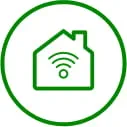When you’re deciding on what kind of internet plan to get, you're likely to encounter terms like "shared" and "dedicated" internet. While both options connect you to the world, they offer very different digital experiences in terms of speed, reliability and cost. Understanding these differences is crucial in making the right choice for your home or business. Let’s talk about what shared and dedicated internet mean, how they work and which one might best suit your needs.
What is shared internet?
Shared internet refers specifically to "cable" internet, where multiple users or households share the same bandwidth provided by an internet service provider (ISP). When someone mentions having “cable,” they are indicating that they are using shared internet. Bandwidth, in this context, is the maximum amount of data that can be transmitted over that connection within a specific time frame. This type of connection is the most common among residential customers. In shared internet configurations, ISPs allocate a set amount of bandwidth to a group of users within a particular area, which can lead to slower speeds during peak usage times.
Think of it this way: shared internet is like a highway. During peak hours, when more people are online, the connection can slow down, just like traffic gets congested during rush hour. In technical terms, this slowdown occurs because multiple users are drawing from the same pool of bandwidth.
Pros of shared internet
- Cost-effective: Since the cost of the bandwidth is split among many users, shared internet is usually more affordable than dedicated internet.
- Widely available: Most ISPs offer shared internet plans, which makes them accessible to people in both urban and rural areas.
- Suitable for casual use: For general browsing, streaming and social media use, shared internet provides sufficient speed and reliability.
Cons of shared internet
- Variable speeds: During peak usage times, such as evenings or weekends, you’re likely to experience slower speeds because multiple users and households are using the same connection.
- Lower reliability: Shared internet connections tend to be less reliable due to the constantly fluctuating number of users.
- Security concerns: While ISPs provide basic security measures, a shared network is generally more susceptible to security breaches than a dedicated connection.
What is dedicated internet?
As its name implies, dedicated internet means you have a direct, private connection to your ISP’s network. Unlike shared internet, dedicated internet provides a fixed amount of bandwidth that is not shared with any other users. This type of connection is more common among businesses but is available to residential customers who require, or prefer consistent, high-speed internet.
Dedicated internet functions like a private toll road: you get the full speed limit at all times, and there’s no traffic to slow you down. You have a continual amount of bandwidth that is solely for your use, ensuring consistent speed and reliability regardless of the time of day or the number of users online.
Pros of dedicated internet
- Consistent speeds: With dedicated internet, you get the exact speed you’re paying for, with no slowdowns during peak times.
- High reliability: Because the connection is not shared, dedicated internet offers much more stable, reliable performance.
- Enhanced security: Dedicated connections offer higher levels of security, which is particularly important for businesses handling sensitive data.
Cons of dedicated internet
- Higher cost: Dedicated internet typically costs more than shared internet due to the guaranteed bandwidth and higher quality of service.
- Limited availability: It may not be available in all areas, particularly in rural locations.
- May require professional setup: Dedicated connections often require professional installation and may need specialized equipment.
Which one is right for you?
As with most things, choosing between shared and dedicated internet depends on your specific needs, budget and location. Here are some scenarios to help you decide:
Opt for shared internet if
- You’re a casual user: If you primarily use the internet for browsing, streaming, social media and the occasional video call, shared internet should be all you need.
- You’re budget-conscious: Shared internet plans are typically more affordable and can provide good value for general, everyday use.
- You live in a high-availability area: If you live in an area with a robust network infrastructure, shared internet might offer sufficient speeds even during peak hours.
Opt for dedicated internet if
- You run a business: Businesses that rely on the internet for critical functions, such as video conferencing, data transfer and cloud applications, will benefit greatly from the enhanced reliability and speed of a dedicated connection.
- You’re a power user: Gamers, heavy streamers and households with multiple devices using the internet simultaneously (which seems to be every household, these days) will appreciate the consistent speed and low latency of dedicated internet.
- You handle sensitive data: If you deal with sensitive or regulated information, a dedicated connection offers increased security features.
The Ziply Fiber difference
At Ziply Fiber, we understand that every customer has unique needs. That’s why we offer both shared and dedicated internet plans to suit a variety of users. Our fiber optic internet provides some of the fastest speeds in the Northwest, whether you’re on a shared or dedicated plan. With low latency, high reliability and scalable options, Ziply Fiber is committed to providing the best internet experience, regardless of your choice.
Why choose Ziply Fiber?
- Superior network infrastructure: Our fiber optic network is designed for speed and reliability, ensuring you get the most out of your internet connection.
- Local support: We’re based in the Northwest, so we’re intimately familiar with the unique needs of our residential and business communities.
- Flexible plans: Whether you need a cost-effective shared internet plan or a robust dedicated connection, we have options to fit your needs and budget.
Ready to upgrade your digital experience? Contact Ziply Fiber today to learn more about our internet plans and find the one that best fits your needs.






